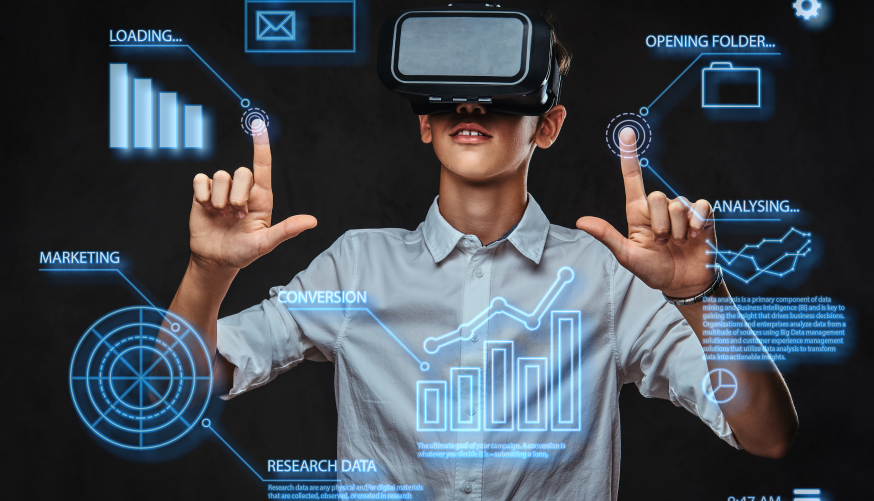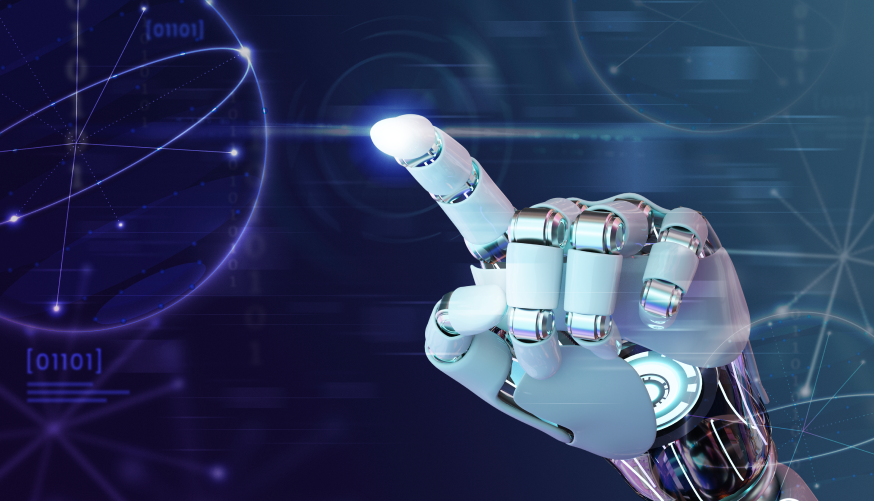
The terms Artificial Intelligence (AI) and Machine Learning (ML) have been interpreted in different ways, even interchangeably at times.
These terms are used in a similar context while discussing predictive analytics, big data, and various other related topics. But, these technologies vary in different ways, in terms of applications, scope, and much more.
AI and ML products have increasingly gained recognition since businesses used them for processing and analyzing the massive volume of data, making informed decisions, developing real-time recommendations and insights, and generating accurate predictions, forecasts, etc.
How do ML and AI vary, how are both connected, and in what ways do these terms influence your organizational decisions today?
Let's break down the concepts, explore the answers to the above questions, and consider artificial intelligence vs machine learning comparisons in detail through this blog post.
| Table of Contents |

The concept of Artificial Intelligence is broader, which defines the use of technologies to develop computers and systems with the capability to mimic the cognitive skills connected with human intelligence.
This involves the ability to see, understand, and react to spoken and written language, performing data analysis, generating recommendations, etc.
AI is often considered as a solution with a set of technologies, incorporated in the system to help find reason, learn, and respond to solve complex problems.

Machine learning is a subset of Artificial Intelligence– it lets the system automatically understand, enhance, and implement data-driven decisions based on experience.
Rather than explicit programming, Machine learning leverages algorithms to identify huge amounts of data, learn using insights, and generate informed decisions.
ML algorithms boost their performance with time as they get trained and exposed to the data.
Machine learning models produce output based on what the program learns from functioning and algorithm while training data. The use of more data results in a better model as the outcome.
If you wonder how machine learning functions, here is what it does. Machine learning uses two techniques namely supervised learning and supervised learning.
Supervised learning helps to train a model with the known input and output of data to predict future outcomes.
Unsupervised learning helps to find hidden patterns and intrinsic structures of the data input.
Also, read more about How Artificial Intelligence (AI) Can Change Web Design & Development
Machine learning and Artificial Intelligence aren't obviously the same thing; however, they are well connected.
The easiest way to understand how ML and AI relate to one another is: artificial intelligence is a wider concept of making a machine or system to detect, reason, act and respond like human beings.
Machine learning is an AI application. That lets machines or systems extract the required knowledge from data and further learn autonomously from it. One quickest way to remember their differences is to think of them in terms of umbrella categories.
AI is the main arch term for algorithms and approaches. ML falls under this umbrella, however, and directs to many other subfields like robotics, deep learning, Natural Language Processing, expert systems, and so on.
Now that you understand how they are connected, let's know what is the main difference between AI and ML.
While AI talks about the idea of a system mimicking human intelligence, this is not the concern of Machine learning.
It instead teaches the system how to perform particular tasks and offers accurate results through the identification of patterns.
For instance, when you ask your smart home device, “How long does it take for today's trip?"- In this query, you enquire about the system, while the machine responds about the approximate time it would take to reach.
Here, the overall objective of the device is to successfully implement a task —the task you would usually need to do in a real-world atmosphere yourself.
Based on this context, ML doesn't focus only on enabling the system to perform particular tasks– ie., you might equip algorithms to understand the traffic data and live transit to perform the volume and density forecasting for the traffic.
However, the traffic is confined to understanding the accuracy of prediction, identification of patterns, and learning from data to improve performance for the particular task.
Let’s see the key reasons for using artificial intelligence in business systems.
Let's discuss the key reasons for using Machine learning in business systems.
Also, read more about AI in eCommerce

Businesses in most industries are exploring new opportunities with the use of AI and Machine Learning together. Certain capabilities have helped businesses while using these technologies together to transform the processes and the products:
This feature lets the companies discover the cause-and-effect relationships in data, thereby predicting the trends and behavioral patterns.
Using recommendation engines, businesses use data analytics to provide product recommendations to users who might be interested in them.
Speech recognition helps the computer system to detect the words in spoken language, and recognize the meaning in either spoken language or written format with the Natural language understanding technique.
These features make it easy to recognize objects, faces, and actions in images and videos, thereby implementing the functionalities like visual search.
The computer system leverages sentiment analysis to classify positive, negative, neutral, and opposite attitudes of the users in terms of text.
You might have used AI-fueled equipment or service in your daily life without even knowing it. AI and Machine Learning together can be used in everyday life in applications like banking programs for shady transactions, auto-spam filters to filter inboxes from viruses, video streaming platform recommendations, etc. Let's take a deep dive into the few applications of AI and ML used every day.
Retail: The retailers use Artificial Intelligence and machine learning technologies to manage their inventories, develop recommendation engines, and improve the customer experience through visual search.
Healthcare: Health organizations use the combination of Artificial Intelligence and machine learning to deploy applications like image processing to facilitate cancer detection and predictive analytics.
Finance and banking: AI and machine learning are integral tools to serve the purposes like fraud detection, risk prediction, proactive financial advice, etc.
Sales and marketing: The marketing and sales teams use the technologies to offer personalized offers, sales forecasting, sentiment analysis, optimization of campaigns, etc.
Cybersecurity: The combination of powerful AI and machine learning weapons are used to ensure cyber security which helps businesses to secure themselves and protect the interest of the customers through anomaly detection.
Customer service: Businesses belonging to a wide range of industries use the applications of cognitive search and chatbots to resolve queries, measure customer intent, and offer virtual assistance.
Transportation: The use of intelligence and ML together can help in transportation applications where businesses can boost the efficiency of the routes, utilize predictive analytics, etc. for the applications like traffic forecasting.
Manufacturing: Manufacturing firms use these technologies to implement predictive maintenance and manage operations efficiently.
Also, read more about How AI is Transforming e-Learning

The strong relationship between artificial intelligence and machine learning has given birth to many powerful advantages for businesses in almost all industries. The new possibilities have emerged tremendously with the top benefits for the business as follows:
They enable businesses to explore valuable insights to interpret and analyze structured and unstructured data sources.
Businesses need to improve data integrity and intelligence to minimize human error, with a combination that leads to the best data-driven decisions.
Through these tools, businesses become highly efficient with process automation that saves on costs and free up your time, resources, etc. for other priorities.
The combination of these technologies helps to empower the employees through the integration of predictive analytics and business insights into the business applications, reporting, etc.
While all Machine Learning belongs to AI, all AI cannot be Machine Learning. AI is a broader term and comprises machine learning.
If your business keeps looking to leverage machine learning, you need AI to let it exist. Apart from these differences, it's evident that the adoption of Artificial intelligence in four business strategies can lay your edge over the competition.
Today, we move closer to accomplishing business goals with automation, intelligence, and exciting technologies in place.
Thanks to the technologies evolving continuously, and bringing new possibilities in AI vs ML for business transformation.
IPIX Technologies is a premier web development company in India, specializing in crafting captivating websites. With our expert team, we ensure each phase of development is executed flawlessly. Trust us to provide unparalleled services that showcase your business's true potential. Experience the power of innovative web development with IPIX Technologies.